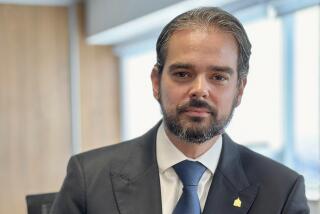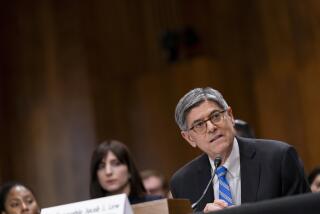Nuclear watchdog elects Japanese diplomat as its leader
VIENNA AND BEIRUT — After a months-long deadlock and half a dozen inconclusive votes, the world’s atomic energy watchdog on Thursday elected as its leader a Japanese diplomat described as colorless by foes and competent by allies.
Yukiya Amano, formerly Japan’s envoy to the International Atomic Energy Agency, or IAEA, will serve as director-general of the United Nations agency when Mohamed ElBaradei, an outspoken Egyptian diplomat, retires this year.
Amano’s rivalry with South African candidate Abdul Samad Minty emerged as a competition between the West, which wants the agency to focus on preventing countries such as Iran and Syria from obtaining nuclear weapons, and developing nations more concerned with disarming nuclear powers and spreading atomic energy technology to poorer nations.
Amano barely secured the necessary two-thirds vote of the agency’s board of governors and must now be approved today in an open session with the governors and the general conference, where the board is expected to confirm him by acclamation, said Taous Feroukhi, the board’s chairwoman.
She had pushed hard to end the deadlock by this week.
“I will do my utmost to enhance the welfare of human beings, ensure sustainable development through the peaceful use of nuclear energy,” Amano told reporters after the vote at the U.N.’s sprawling compound in Vienna.
Amano referred to Japan’s experience during World War II, when the U.S. dropped atomic bombs on the cities of Hiroshima and Nagasaki.
“As a national coming from Japan, I will do my utmost to prevent the spread of nuclear weapons,” he said. “In order to do that, solidarity of all the member states, countries from the north, from the west, from the south, from the east, is absolutely necessary.”
Analysts and diplomats view Amano’s ascent as a victory for Western nations that hope to confine the agency’s mandate to narrow technical issues. He is believed to hew closely to the U.S. position on Iran, whose nuclear research program has become the agency’s main concern in recent years.
The U.S. and other Western nations believe Iran is using what it professes to be a civilian nuclear energy program as a cover to develop weapons.
Some accused ElBaradei of politicizing the agency by making public statements about what he described as the West’s double standards on the issue of nuclear nonproliferation, as well as his comments about how the Arab-Israeli conflict contributed to Middle East insecurities. But the charismatic ElBaradei, beloved by much of the agency’s rank-and-file staff, also dramatically raised the profile of the IAEA, helping place arms control on the front burner of international issues. He and the agency won the 2005 Nobel Peace Prize for their work.
--
More to Read
Sign up for Essential California
The most important California stories and recommendations in your inbox every morning.
You may occasionally receive promotional content from the Los Angeles Times.









